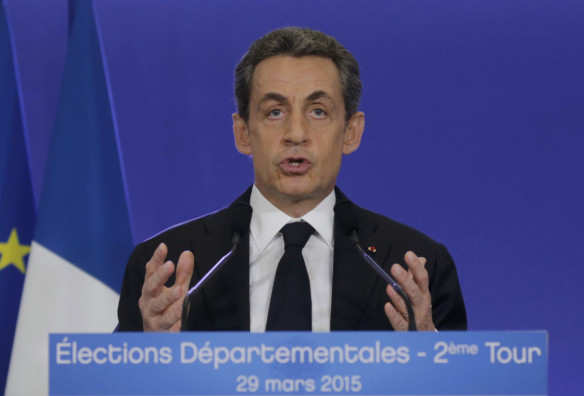
The second round of French local elections’, which was held last Sunday, did not reveal anything that wasn’t already known: a French Socialist Party (PS) in total disarray; a near demise of the Greens, a victory of the Centre-Right alliance (UMP-UDI) with former president Nicolas Sarkozy; and a confirmation of the National Front (FN) as a key player. Representing about one-third of the French votes, the PS will likely manage one-third of the ‘Departments’ (an administrative unit gathering townships), the Right about two-thirds, and the National Front, none: a characteristic of the French democracy, which will allow Marine Le Pen to go on talking of the ‘UMPS’ — the purported commonality of interest between the PS and UMP that have been pursuing roughly similar policies over the years.
Will that result change anything in French politics? Probably not. President Hollande knows he will remain unpopular as long as there is no improvement in the job market — which also means he can be back in the picture when the first signs of improvement appear. Prime Minister Manuel Valls was already confirmed in the job before the elections — results of which had been widely anticipated. Actually, Valls will go on playing his part: there is no room on his right, and the ‘slingers’ on his left represent too small a segment to constitute a threat. He thus can only go on with reforms — or what is left of them once passed in parliament, and cross fingers for an economic recovery.
But crossing fingers is not enough to answer to France’s needs: a vigorous action against public spending, a resulting easing on taxes, a firm hand on security and immigration — actually, what Marine Le Pen’s programme offers.
Assuming the UMP is finally able one day to present an action plan, and a consensual leader is chosen for the next presidential elections, one may wonder what the future holds for the National Front: a desultory event, something like a furuncle revealing an underlying infection that disappears with the infection; or a new partner capitalising on one-third of the French vote, with whom one or the other will have to ally if willing to govern — until the Front makes it alone?
It may be intellectually comforting to suggest the UMP-UDI could “make the National Front useless”, or less prosaically, to propose implementing those measures for which the French vote for the Front and, in so doing, ‘siphoning out’ the Front’s programme. Sarkozy employed this strategy during the last presidential campaign — but it did not work. Sarkozy has been smart enough to understand that any kind of alliance with the Front would mean the end of the UMP. But he also knows what a significant chunk of supporters wants. Reconciling everybody won’t be easy, as the organisation of the party has already shown. As for the programme, the French have been waiting for it for two years and (with the noticeable exception of hard-working former PM François Fillon) very little has emerged; they are therefore getting tired.
The stigmatisation of the National Front by PS and UMP — which once again strengthens the idea that both are working hand in hand to protect their common acquired advantages, can only lead to future electoral successes for Le Pen (the next regional elections are scheduled in December of this year, and presidential election in May 2017). A way to short-circuit the Front would be to involve it in the daily management process of the country through timely alliances, a move which is just unconceivable in the present French intellectual environment.
A first conclusion is therefore that France is entering a three-tier political system for the first time since 1958, one which never allowed the country to be managed properly.
Long way from change
Another conclusion is that France is likely to remain on the same road for the next two years; a path made of half-decisions, half-measures, weakened political will and, consequently, half-baked results. It is still a long way before things (possibly) change, whereas the present low interest rates, favourable euro-dollar currency exchange rate and low oil prices offer opportunities that may not come again. Until 2017, a minority political force (at best, one-third of the electorate), will be in charge, with the popularity of its leaders decreasing week after week; and none of them will obviously remit their mandate into the people’ hands before their term. As compared to them, Sarkozy will keep coming back with the same supporters, the same absence of consensus on his leadership and a programme which has been pending for two years. When people slip into despair, they often lack cogitation. Marine Le Pen understood it perfectly well and it is nothing new, as the polls just confirmed.
Socialists are thus steadily disappearing, the Right has reclaimed lost ground and the National Front has established itself as a third player. But one-third of the votes never made a majority, and a tired population may well decide some day that the situation has gone on long enough.
Luc Debieuvre is a French essayist and a lecturer at Iris (Institut de Relations Internationales et Strategiques) and the Faco Law University of Paris.









